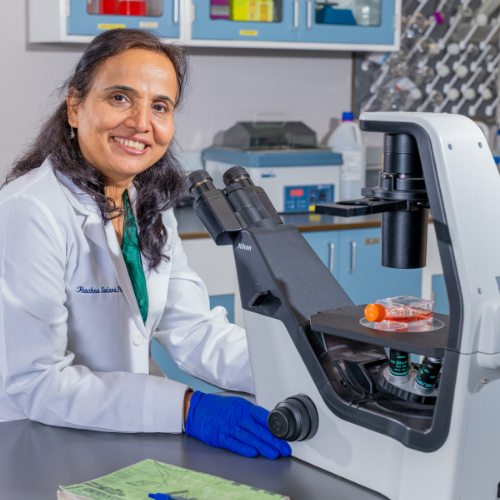For Dr. Rachna Sadana, a Professor of Biology and Department Chair in the Natural Sciences department, life and work revolve around two core principles: cultivation and growth. Whether she develops the research skills of her students, pursues personal interests like yoga, dance classes, and tennis, and oversees faculty career development within the department, she is driven by a passion for helping others thrive. Yet, there is one area where her expertise is singularly focused on halting growth: the progression of cancer cells.
In her lab, Sadana and her students focus on the initial stages of anti-cancer drug discovery, a process that is complex and can take decades to go from a promising synthesized compound to an FDA-approved medication. Her work takes place early in that process: rigorously testing new compounds supplied by collaborating chemists for their ability to inhibit or kill cancer cells. "I train students I train students in laboratory methods to screen compounds for cytotoxicity and study cell death mechanisms, while primarily fostering critical thinking and problem-solving skills through troubleshooting experiments—transferable skills valued by employers." This work has also benefited UHD financially, with Sadana securing several externally funded grants as a Co-Principal Investigator (PI) and a $75K grant as PI from The Welch Foundations for lab equipment.
What sets her approach apart, however, is the commitment to undergraduate involvement. Over the last decade and a half, she has personally mentored more than 140 students and published 21 journal articles, out of which 16 undergraduates Gators have co-authored. "For a lot of them, even some of them who were struggling academically, this hands-on experience sparked a light in them," said Sadana. Many of her former students have gone on to medical schools, graduate programs, and critical roles in other research labs.
And it is that—the building up of the next generation of cancer researchers—which stands as perhaps her most significant contribution, as both they and her will continue to address humanity's most pressing health challenges, ensuring a healthier future for us all.

